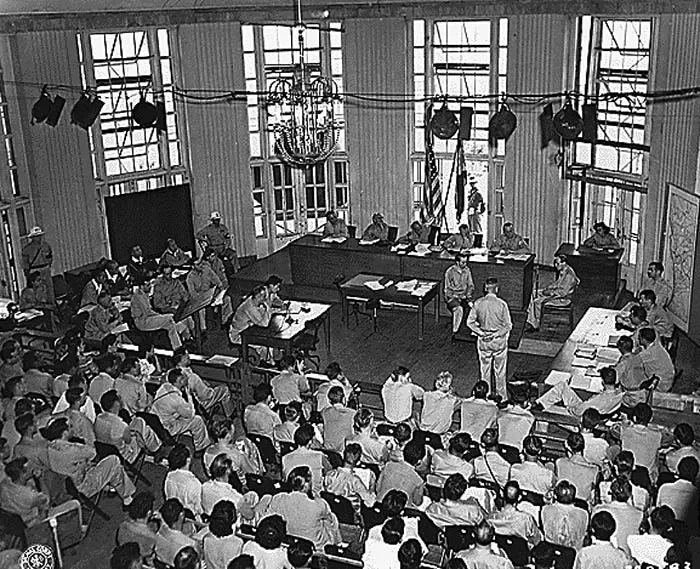Testimony of Modesta Remo on Her Husband’s Death at the Hands of the Japanese in San Jose, Batangas in 1945
[TRANSCRIPTION]
This page contains the testimony of one Modesta Umali Remo of San Jose, Batangas regarding Japanese atrocities she suffered and observed during World War II. The pages contained herein now declassified and were part of compiled documentation1 of war crimes trials conducted by the United States Military Commission after the conclusion of World War II. Most of the testimonies were translated from Tagalog and have been corrected for grammar by Batangas History, Culture and Folklore where possible. The pagination is as it was contained in the original document for citation purposes.
[p. 4]
R E S T R I C T E D
Q Please state your full name, age, address and nationality.
A Modesta Umali Remo, 41 years old, Poblacion, San Jose, Batangas Province, P. I., Filipino.
Q What is your occupation?
A Pharmacist.
Q Do you intend to remain at your present address, and if not, how can your future whereabouts be ascertained?
A Yes, I intend to remain at my present address.
Q Did you suffer any mistreatment at the hands of the Japanese?
A No, but my husband was killed by the Japanese.
Q Will you please relate fully what happened with regard to the killing of your husband by the Japanese?
A On January 27, 1945, my husband, Venancio Remo, aged 40, then the municipal secretary; Bienvenido Oblea, aged 27, a policeman; Eliseo Villanueva, aged 27, my servant; and I were hiding in our shelter which was under our house. Avelino Lara sighted about 30 Japanese coming towards the municipality. He told this to my husband who went out of the shelter to meet the Japanese. I was looking at him through the hole in our shelter. I saw that two Japanese tied him while three others had fixed bayonets ready, pointed towards him. When I saw this, I ran out of the shelter and escaped. I never saw my husband again. After I escaped, the Japanese burned our home and drugstore.
I was informed by one Gavino Guce that the bones of my husband were in the sitio of Ambonambon in the barrio of Pinagtungulan. My sister, Maxima Umali, and the uncle of my husband, Esteban Remo, Eugenio Remo and Eliseo de Leon went to that place on May 30, 1945 and found three bodies. They recognized these bodies as the remains of our parish priest, Vicente Frandi, aged 55; my husband, Venancio Remo, aged 40; and the clerk of court, Jose Talag, aged 27. The priest was identified because of his robe and false teeth and my husband because of his forehead. Pastora Talag recognized the third body as her brother.
Q Do you know the names of any of these Japanese who took your husband?
A I only know one, Watanabe, an interpreter who was about five feet six inches tall, slender built, about 30 years old, smooth shaven, short-cropped hair, no glasses, dark complexion. He was the liaison officer between the Japanese military and the Filipino civilians.
Q Can you describe any of these Japanese besides Watanabe?
A No.
Q Can you describe their uniform?
A They wore khaki uniform.
[p. 5]
Q Can you describe their insignia?
A No.
Q Do you know what unit they belonged to?
A No.
Q I hand you Exhibit “D” and ask you what it is.
A It is a picture of me holding my baby, and my maid is standing beside me. We are standing in front of the ruins of our home and drugstore in the Poblacion of San Jose, Batangas, P. I.
Q When was your home and drugstore burned?
A In the month of February of this year when the Japanese were in San Jose, killing people and burning their homes. Our home and drugstore was valued at ₱5,000, pre-war prices, and we lost everything we owned.
Q Have you anything else to add to your statement?
A No.
/t/ MODESTA UMALI REMO
COMMONWEALTH OF THE PHILIPPINES
PROVINCE OF BATANGAS
TOWN OF SAN JOSE
/t/ MODESTA UMALI REMO
/t/ ALLAN H. PEOPLES, Capt., CAC
Investigating Detachment
[p. 6]
C E R T I F I C A T E
|
Municipal Bldg., San Jose, Batangas Province, P.I. |
/s/ Allen H. Peoples /t/ ALLEN H. PEOPLES, Capt., CAC |
| 31st October 1945 |
/s/ Charles C. Thompson /t/ CHARLES C. THOMPSON, Capt., TC |

